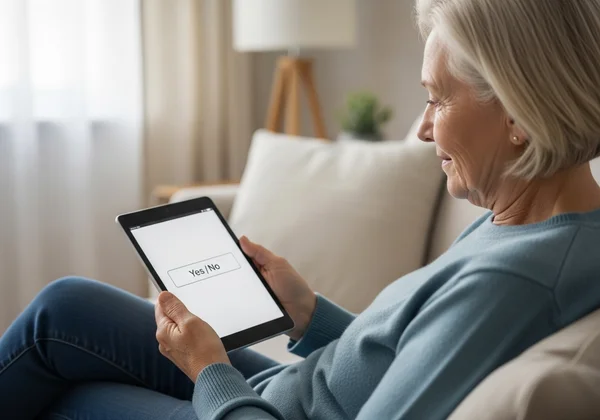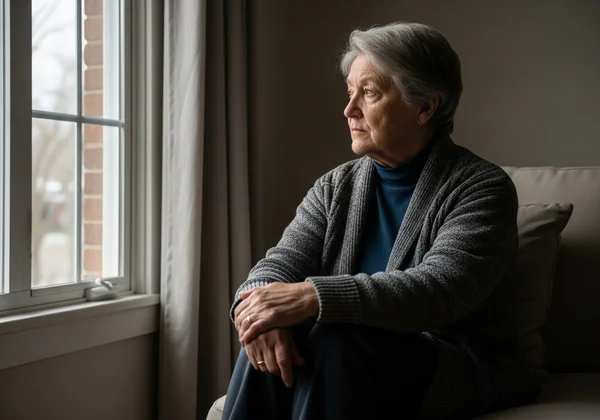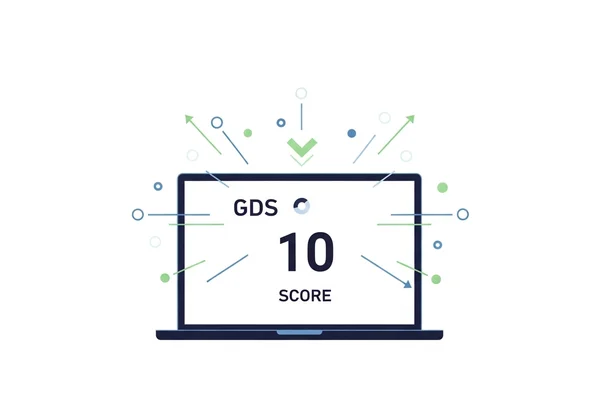Geriatric Depression Scale (GDS): A Senior's Guide to Mental Health Conversations
October 27, 2025 | By Arthur Vance
Starting a conversation about your mental well-being can feel daunting, especially as we age. It's a topic often shrouded in silence, met with the worry of being a burden or the simple uncertainty of where to even begin. This guide is here to empower you, our fellow seniors, to confidently discuss your emotional health with family or doctors. If you've ever wondered what is the Geriatric Depression Scale (GDS)?, you'll learn how this simple tool can serve as an objective, helpful starting point to open up that important dialogue.
It’s completely normal to feel hesitant. But having a concrete tool can make all the difference. The Geriatric Depression Scale is not about labels; it's about clarity. It provides a gentle, private way to check in with yourself and gives you a tangible result to share. Taking this first step can be incredibly empowering, and you can begin your assessment right now, free and confidentially.

Overcoming Barriers: Why Senior Mental Health Talks Are Hard
Embarking on a journey toward better emotional health often begins with a single conversation, but for many seniors, this first step is the hardest. Understanding the barriers is crucial for anyone seeking senior mental health help. We often face unique societal and personal pressures that can make speaking up feel almost impossible. Recognizing these hurdles is the first move toward overcoming them.
Many of us grew up in an era where mental health wasn't openly discussed. Voicing feelings of sadness or anxiety was sometimes seen as a sign of weakness rather than a normal part of the human experience. This lingering stigma can create a powerful internal resistance, making us feel isolated just when we need connection the most.
The Stigma of 'Just Getting Old'
One of the most pervasive myths is that feeling down, losing interest in hobbies, or experiencing persistent fatigue is simply a normal part of aging. You might hear it from others or even tell yourself, "This is just what happens when you get older." This mindset is not only inaccurate but also harmful. The stigma of aging often dismisses legitimate emotional struggles as inevitable decline, preventing many from seeking the support they deserve. Your emotional well-being is vital at every age, and it should never be written off as an unavoidable consequence of growing older. True wellness involves acknowledging these feelings and understanding that support is available.
The Fear of Burdening Loved Ones
Another significant emotional barrier is the deep-seated fear of becoming a burden to family and friends. You may worry that sharing your struggles will cause your children to worry, or that you'll add stress to the lives of those you care about most. This concern comes from a place of love, but it can lead to profound loneliness. Your loved ones would much rather understand what you're going through and offer support than see you suffer in silence. The feeling of being a family burden is a common fear, but opening up is an act of trust that can strengthen, not strain, your relationships. It allows those who care about you to be there for you in a meaningful way.

Leveraging the Geriatric Depression Scale for Clarity
When words fail us, data can provide a clear starting point. This is where a tool like the geriatric depression scale online becomes so valuable. Instead of trying to describe a vague feeling of being "off" or "unhappy," you can use a structured, evidence-based screening to get an objective snapshot of your emotional state. This shifts the conversation from something abstract and emotional to something concrete and manageable.
Using a validated tool removes the guesswork and self-doubt. It’s not about self-diagnosis; it's about gathering information. This information serves as a key to unlock a more productive and focused conversation with your doctor or family, ensuring your concerns are understood and taken seriously.
What Exactly is the GDS?
The Geriatric Depression Scale, or GDS, is a widely respected screening tool designed specifically for older adults. Developed by Dr. J.A. Yesavage and colleagues, it consists of a series of simple "yes" or "no" questions about how you've felt over the past week. It intentionally avoids questions about physical symptoms that can overlap with other age-related health conditions, focusing purely on your mood and emotional well-being. Think of it as a guided self-reflection that helps you organize your feelings into a clear, understandable format. It’s a gentle first step that you can take privately and comfortably from your own home.
How Your GDS Score Provides an Objective Starting Point
After you answer the questions, you receive a score. This number is the core of its utility. Your GDS score is not a judgment or a diagnosis. Instead, it serves as an objective starting point for a conversation. Rather than saying, "I think I might be depressed," you can say, "I took the Geriatric Depression Scale, and my score was X. The result suggests it might be a good idea for us to talk about my emotional health." This simple shift can make a world of difference. It transforms a subjective feeling into a piece of objective information, making it easier for you, your family, and your doctor to address the issue directly and constructively. Taking the free screening test gives you this powerful starting point.

Scripts & Strategies: Starting the Conversation
Having your GDS score is one thing; using it to start an elderly mental health conversation is the next step. Arming yourself with a few simple phrases and strategies can ease the anxiety of bringing up the topic. Remember, the goal is not to have all the answers but simply to open the door for support and professional guidance.
Talking to Your Doctor: Key Phrases & What to Expect
Your doctor is a key ally in your health journey, and they are trained to have these conversations. Be direct and use your GDS score as your opening.
- Key Phrase 1: "Doctor, I've been feeling down lately. I took a screening called the Geriatric Depression Scale online, and my score was [your score]. Could we talk about what this might mean?"
- Key Phrase 2: "I'm here for my check-up, but I also wanted to discuss my mood. This screening helped me realize it's something I need to address."
- What to Expect: Your doctor will likely ask you more questions about your mood, energy levels, and daily life. They may discuss various support options, from therapy to lifestyle changes or medication. View this as a collaborative process where you are an active participant.
Opening Up to Family or Caregivers
Talking to loved ones requires a slightly different approach, focusing on connection and a request for support.
-
Key Phrase 1: "I'd like to share something with you that's been on my mind. I haven't been feeling like myself lately. I took this online screening, and it helped me understand my feelings better. Could we look at it together?"
-
Key Phrase 2: "I need your support with something. I'm going to talk to my doctor about my emotional health, and it would mean a lot to have you there with me."
-
What to Expect: Your family may feel concerned, but their primary goal will be to help. Sharing your GDS results gives them a concrete way to understand and a clear path to offer support, whether it's helping you make an appointment or just being a better listener.

When to Seek Professional Guidance: Beyond the GDS
It is absolutely crucial to remember that the GDS is a screening tool, not a diagnostic one. Its purpose is to identify potential concerns and facilitate a conversation with a qualified professional. A high score is an indicator that it's time to seek professional guidance. Only a doctor, psychiatrist, or psychologist can provide an accurate diagnosis and develop a treatment plan tailored to your needs. The GDS is your powerful first step, and a professional is your partner for the rest of the journey. This important screening tool is the bridge to getting the expert care you deserve.
Empower Your Journey: Take the First Step Towards Well-being
Navigating conversations about mental health can be challenging, but you don’t have to do it alone or without the right tools. The Geriatric Depression Scale is more than just a questionnaire; it's a key that can unlock vital conversations, a bridge to understanding, and a powerful first step on your path to emotional well-being. It provides the clarity and confidence needed to speak with your family and doctor.
Taking control of your mental health is a profound act of self-care and strength. Your feelings are valid, and support is available.
Ready to gain the clarity you need for your next conversation? Visit our homepage to take the free GDS test today. It’s confidential, simple, and the first step toward a brighter tomorrow.
Frequently Asked Questions About Senior Mental Health & GDS
What is the Geriatric Depression Scale (GDS)?
The Geriatric Depression Scale (GDS) is a scientifically validated screening tool created specifically for older adults. It uses a simple yes/no format to help identify potential symptoms of depression. It is not a diagnostic tool but serves as an excellent starting point for a conversation with a healthcare professional.
What does a high score on the Geriatric Depression Scale mean?
A high score on the Geriatric Depression Scale suggests that you may be experiencing significant depressive symptoms. It indicates that a follow-up conversation with a doctor or mental health professional is strongly recommended to get a formal assessment and discuss potential support options. It is an alert, not a diagnosis.
Is the Geriatric Depression Scale a diagnostic tool?
No, it is essential to understand that the Geriatric Depression Scale is a screening tool, not a diagnostic tool. A screening tool identifies individuals who might be at risk for a condition, while a diagnosis can only be made by a qualified healthcare professional after a comprehensive evaluation. You can use our online tool as a first step before consulting a professional.
Who can use the Geriatric Depression Scale?
The Geriatric Depression Scale is designed primarily for seniors to self-assess their emotional well-being. However, it is also an invaluable tool for family members, caregivers, and healthcare professionals to help them understand and monitor the mental health of an older adult in their care.